On some key national issues, views among Hispanics are diverse and varied, and sometimes distinct from other Americans’ attitudes. For example, most Hispanics say abortion should be legal in all or most cases, but views vary across religious and age groups. And on guns, Hispanics favor controlling gun ownership at higher rates than the general public. These findings come after the Supreme Court recently made major decisions on cases that resulted in restricted access to legal abortions and expanded rights to carry guns in public. When it comes to immigration, a majority of Hispanics say it is a very important policy goal to create a path to legal status for immigrants who arrived illegally to the U.S. as children – a greater share than among the U.S. public overall.
Hispanics and their views on abortion
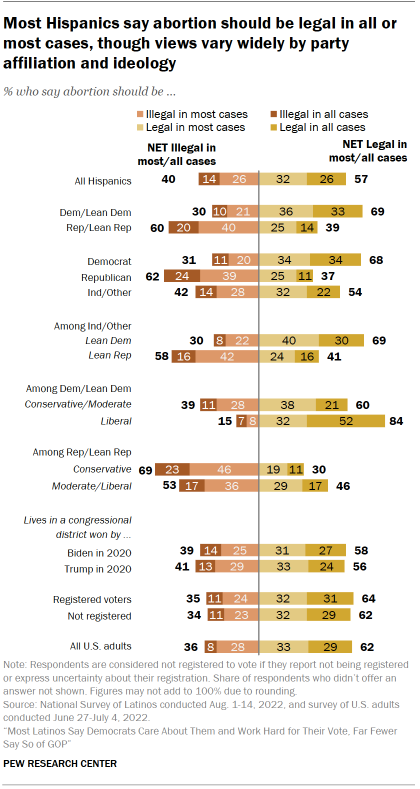
A majority of Hispanics (57%) say abortion should be legal in most or all cases, a slightly smaller share than among the U.S. public overall (62%). Four-in-ten Hispanics say abortion should be illegal in most or all cases.
Views on abortion diverge sharply by party, reflecting the diversity of attitudes among Hispanics. About two-thirds of Hispanic Democrats (68%) say abortion should be legal in most or all cases. By contrast, about six-in-ten Hispanic Republicans (62%) say abortion should be illegal in most or all cases. Hispanic independents and those who do not identify as partisans have more evenly divided views. However, opinions among Hispanic independents who lean toward a party closely resemble those of partisans: 69% of Democratic leaners say abortion should be legal in most or all cases, while 58% of Republican leaners say abortion should be illegal in most or all cases.
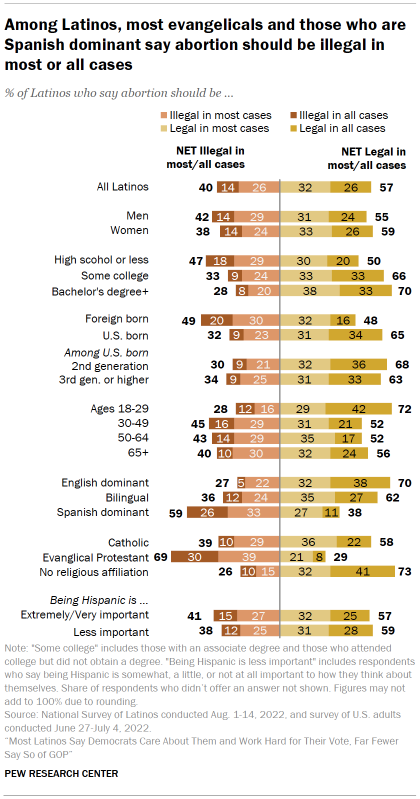
Among Latino Democrats and Democratic leaners, 84% of liberals say abortion should be legal in most or all cases while six-in-ten conservatives and moderates say the same. Meanwhile, among Latino Republicans and GOP leaners, 69% of conservatives say abortion should be illegal in most or all cases, compared with 53% of moderates and liberals.
Views on abortion are also sharply divided by religion. About two-thirds of Latino evangelical Protestants (69%) say abortion should be illegal in most or all cases, while most Latino Catholics (58%) and Latinos with no religious affiliation (73%) say abortion should be legal in most or all cases.
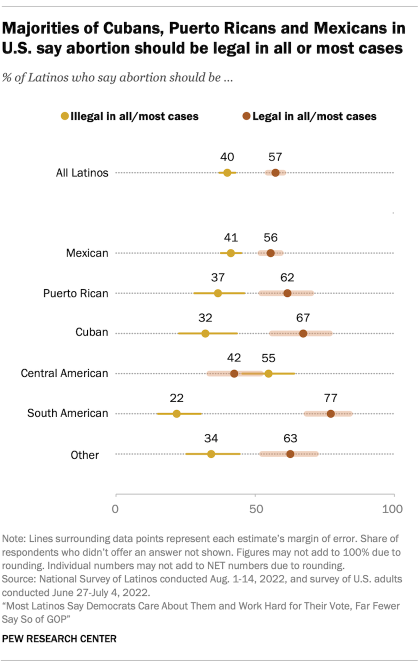
Large differences also exist by language groups. Most Latinos who are Spanish dominant (59%) say abortion should be illegal in most or all cases, while most English-dominant (70%) and bilingual (62%) Latinos say abortion should be legal in most or all cases.
Young Latinos are particularly likely to say abortion should be legal in most or all cases. About seven-in-ten Latinos ages 18 to 29 (72%) say this, compared with about half of Latinos in older age groups.
Most Cubans, Puerto Ricans (62%) and Mexicans (56%) in the U.S. say abortion should be legal in most or all cases. More than three-quarters of South Americans (77%) in the U.S. also say this. By contrast, Central Americans (55%) are more likely than Mexicans (41%), Cubans, or South Americans (22%) to say abortion should be illegal in most or all cases. Central Americans are the only U.S. Latino subgroup listed here who are not more likely to say that abortion should be legal in most or all cases than to say it should be illegal.
Latinos and their views on gun policy
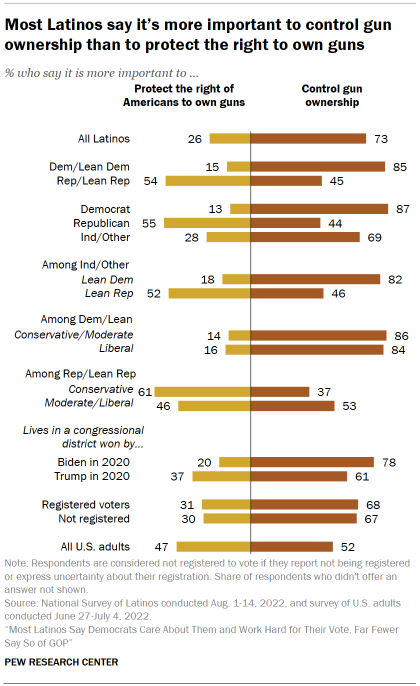
More than seven-in-ten Latinos (73%) say it is more important to control gun ownership than to protect the right of Americans to own guns, greater than the 52% of U.S. adults overall who say the same.
The partisan gap on this issue among Latinos is especially wide: 87% of Latino Democrats say it is more important to control gun ownership, compared with only 44% of Latinos Republicans.
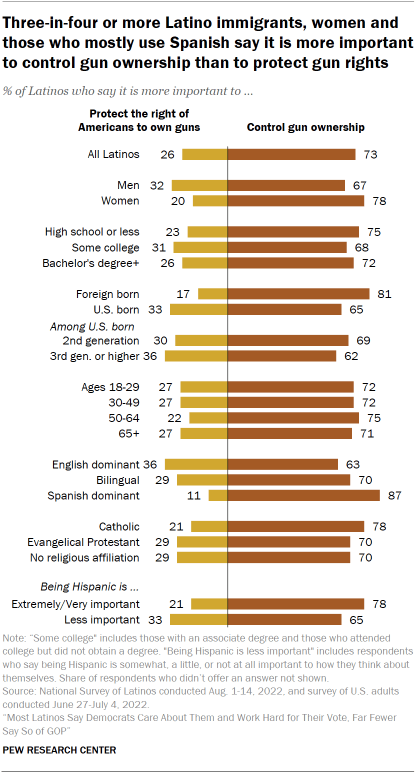
Among Latino Republicans and Latino independents who lean Republican, moderates and liberals are split on the issue, with 46% saying it is more important to protect the right of Americans to own guns and 53% saying it is more important to control gun ownership. Meanwhile, Latino Republicans and GOP leaners who are conservative say it is more important to protect gun rights (61%) than to control gun ownership (37%).
Among Hispanics, immigrants are more likely than those born in the U.S. to say it is more important to control gun ownership than protect the right of Americans to control guns (81% vs. 65%), though a majority of both groups say so.
Hispanics who are Spanish dominant are among the most likely to favor controlling gun ownership over protecting gun rights: 87% in the group take this view, compared with 70% of bilingual and 63% of English-dominant Hispanics.
Views on gun policy are notable for differences by gender. Hispanic women are more likely than Hispanic men to say it is more important to control gun ownership than to protect the rights of gun owners (78% vs. 67%). Still, large majorities of both groups support controls of gun ownership.
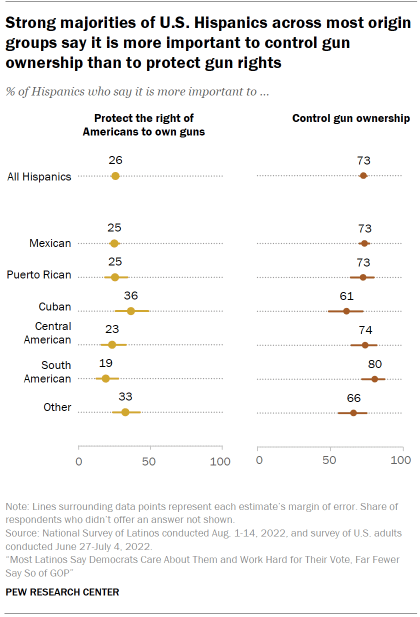
About three-quarters of Hispanics (78%) who say that being Hispanic is extremely or very important to how they think about themselves say it is more important to control gun ownership, compared with 65% of those who say being Hispanic is less important to how they think about themselves.
Every Latino origin subgroup is far more likely to say it is more important to control gun ownership than to say it is more important to protect the right of Americans to own guns.
Clear majorities of South Americans (80%), Central Americans (74%), Mexicans (73%) and Puerto Ricans (73%) in the U.S. say it is more important to control gun ownership than to protect the right of Americans to own guns.
Views on immigration policy
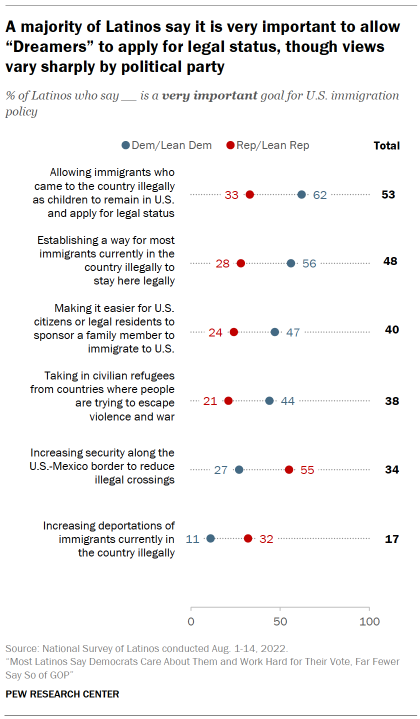
Creating paths to legal status for immigrants – including those who arrived as children, a group some call “Dreamers” – are top immigration policy priorities for Latinos. A slim majority of Latinos (53%) say it is a very important goal to allow immigrants who came to the country illegally as children to remain in the U.S. and apply for legal status. About half of Latinos (48%) also say it is very important to establish a way for most immigrants who are currently in the country illegally to stay here legally.
Smaller shares of Latinos say it is very important to make it easier for U.S. citizens or legal residents to sponsor a family member to immigrate to the U.S. (40%), to take in refugees (38%) and to increase security along the U.S.-Mexico border (34%). Only 17% of Latinos say it is very important to increase deportations of immigrants currently in the country illegally.
Among Latinos, views on immigration policy vary sharply by political party. Latino Democrats and Democratic-leaning independents are far more likely than Latino Republicans and Republican-leaning independents to say it is very important to allow “Dreamers” to remain in the U.S. legally (62% vs. 33%). Partisans are similarly divided on whether it’s very important to establish a way for most immigrants currently in the country illegally to stay legally (56% vs. 28%).
More than half of Latino Republicans and Republican-leaning independents (55%) say it is very important to increase security along the U.S.-Mexico border, compared with only 27% of Latino Democrats and Democrat-leaning independents.
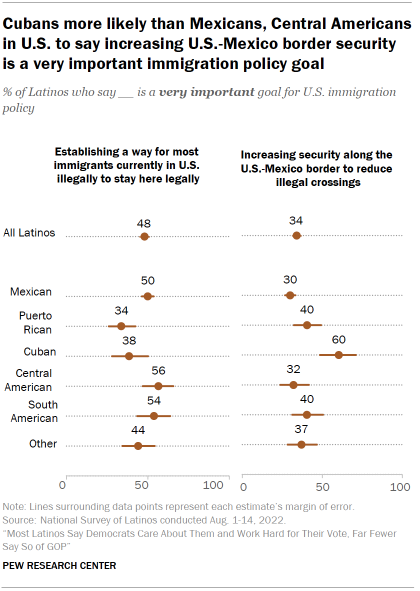
The survey also finds, though, that few Hispanic Republicans and GOP leaners and Democrats and Democratic leaners say it is a very important immigration policy goal to increase deportations. Still, Hispanics who identify with or lean toward the Republican Party are nearly three times as likely to hold this view than Hispanics who identify with or lean toward the Democratic Party (32% vs. 11%).
Roughly half of Central Americans (56%) and Mexicans (50%) in the U.S. say establishing a way for most immigrants currently in the U.S. illegally to stay legally is a very important policy goal – a greater share than among Puerto Ricans (34%).
Meanwhile, Cubans are more likely than Central Americans (32%) and Mexicans (30%) to say that increasing security at the U.S.-Mexico border is a very important immigration policy goal.
U.S. adults overall differ from Hispanics in their immigration policy priorities. The top immigration priority for U.S. adults is increasing border security, which 44% say is a very important goal. Their next-highest priority is allowing immigrants who came to the country illegally as children to stay legally (36%). Roughly one-in-four Americans overall say the remaining immigration policies asked about in the survey are very important goals: increasing deportations (29%); taking in refugees (28%); establishing a way for immigrants currently in the country illegally to stay legally (25%); and making it easier to sponsor a family member to immigrate to the U.S. (25%).
Most Latinos say immigrants should be able to hold on to the customs of their home country
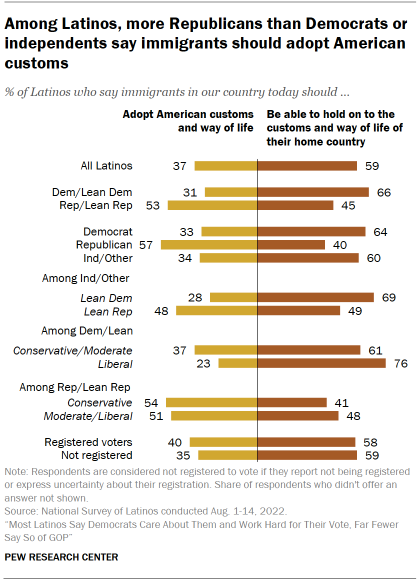
When it comes to immigrants in the country today, Latinos are more likely to say immigrants should be able to hold on to the customs and way of life of their home country than to say immigrants should adopt Americans’ customs and way of life (59% vs. 37%).
About one-third of all Latinos – and nearly half of Latino adults – were born outside the U.S., according to Pew Research Center tabulations of government data. Both shares have been falling in recent years.
Latino Democrats (64%), as well as independents and other non-partisan Latinos (60%), are more likely than Latino Republicans (40%) to say immigrants should be able to hold on to the way of life of their home country. Among independents, nearly seven-in-ten Democratic leaners (69%) support immigrants holding on to their own way of life, compared with roughly half of Republican leaners (49%).
Among Latino Democrats and Democratic leaners, three-quarters of those who describe their political views as liberal (76%) say immigrants should be able to hold on to their own customs, compared with 61% of conservatives and moderates.
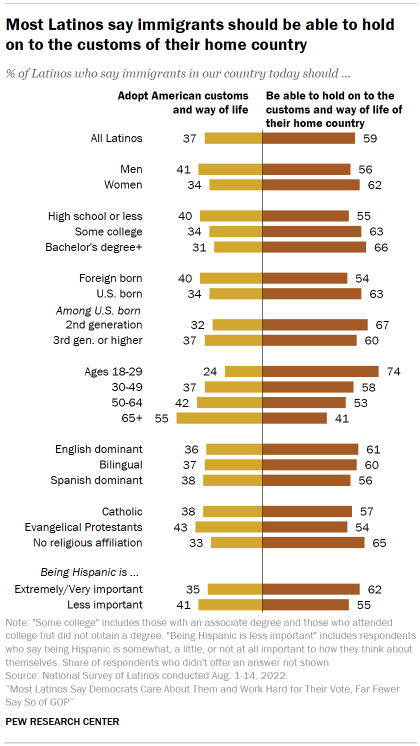
Latino immigrants (40%) are about as likely as Latinos born in the U.S. (34%) to say immigrants should adopt American customs, though fewer than half in each group say so. Additionally, U.S.-born Latinos (63%) and second-generation Latinos (67%) are more likely than Latino immigrants (54%) to say immigrants should be allowed to maintain their unique customs.
Views also vary widely by age. Nearly three-quarters of Latinos ages 18 to 29 (74%) say immigrants in the U.S. should be able to hold on to the customs and way of life of their home country, a greater share than among Latinos ages 30 to 49 (58%), 50 to 64 (53%) and ages 65 or older (41%). Conversely, about half of Latinos ages 65 or older (55%) say immigrants in the U.S. should adopt American customs and their way of life.
Latinos with at least a bachelor’s degree (66%) are more likely than those with a high school education or less (55%) to say immigrants should be able to hold on to their unique customs. And while four-in-ten Latinos with a high school education or less say immigrants should adopt American customs, roughly three-in-ten Latinos with some college experience (34%) or at least a bachelor’s degree (31%) say the same.


